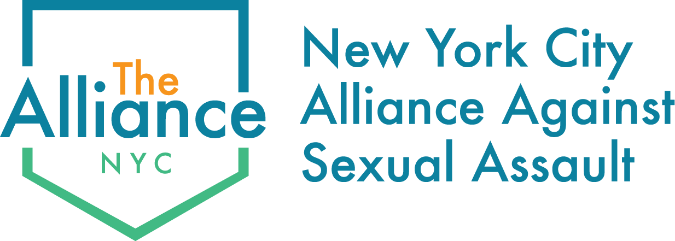Even though sexual violence is extremely common, it is not widely discussed. That’s why we have provided a list of terms to help de-mystify some of the terminology used in the response to sexual violence.
Policy Advocacy
At The Alliance, we define policy advocacy as the work we do to advance budget and legislative initiatives that support survivors and survivor-serving organizations. Policy advocacy is central to our mission.
Rape Crisis Programs
Rape crisis programs provide free, confidential support for survivors of sexual violence. These programs offer emotional support, crisis intervention, and assistance to help survivors heal and navigate their options.
Services provided by rape crisis programs vary in scope but are not limited to the following:
- 24/7 hotline support
- accompaniment to a hospital
- short term counseling
- legal assistance
- assistance in applying for victim compensation.
Click here for the Department of Health’s list of New York State Rape Crisis Programs.
Rape Crisis Program Advocates
Rape crisis program advocates exist to provide support and care to survivors of sexual violence. Their role is to believe the survivor, advocate for their rights and needs, and assist in connecting the survivor with resources to support their healing.
Advocates complete a specialized 40-hour training and are certified through the NYS Department of Health.
SAFE Exam
A Sexual Assault Forensic Exam (SAFE Exam) is a medical exam conducted at a hospital emergency room. It is up to the survivor to determine how much of the exam they are comfortable with.
The Exam can include the following:
- Gathering your medical history
- A physical assessment
- The collection of forensic evidence, sometimes known as a “rape kit”
- Discussing options for STI, HIV, or pregnancy prevention.
- Creating a plan for follow-up treatment and care
For a list of SAFE Designated Training Programs click here.
Sexual Violence
At The Alliance, we define sexual violence as unwanted sexual actions or behaviors. These can be physical, verbal, digital and/or mental. Sexual violence can take place anywhere, to anyone, and on any platform.
Survivor Bill of Rights
The New York State Sexual Assault Victim Bill of Rights outlines key services and supports available to all survivors of sexual violence in New York State. These rights include:
- You can ask for an interpreter if it is hard for you to understand or speak English.
- You cannot be treated differently based on certain characteristics, such as race, national origin, immigration status, religion, sexual orientation, disability, age, source of payment, sex, gender identity, or gender expression.
- Minors under the age of 17 have certain rights to make their own decisions without a parent or legal guardian.
- You can have an exam in any hospital emergency department to collect evidence and provide certain medical care related to the sexual assault at no cost to you.
- You can have an advocate from the local rape crisis program stay with you during the exam.
- You can choose to report to the police or not


